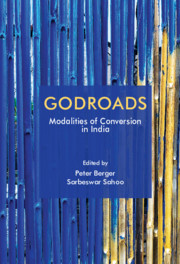Book contents
- Frontmatter
- Contents
- Foreword
- Acknowledgements
- Introduction
- 1 The Rise, Growth and Significance of Shudra Conversion Movements in the Methodist Mission, Hyderabad, 1925–1947
- 2 Communism and the Cross: A Caste–Class Trajectory of Religious Conversion in South India
- 3 Religious Conversion as Ethical Transformation: A Study of Islamic Reformism in Rural West Bengal
- 4 Conversion versus Unity: The Basel Mission among the Badaga on the Nilgiri Plateau, 1845–1915
- 5 Identity Change and the Construction of Difference: Colonial and Postcolonial Conversions among the Sumi Naga of Nagaland, Northeast India
- 6 Conversion to Christianity and Healing: The Naga of Northeast India
- 7 Reshaping the American Evangelical Conversion Narrative in Nineteenth-Century North India
- 8 Cultural Transformations through Performance Arts in Early Twentieth-Century South India
- 9 Reservation and Religious Freedom: Understanding Conversion and Hindu–Christian Conflict in Odisha and Rajasthan
- 10 Rupture and Resilience: Dynamics between a Hindu Reform Movement and an Indigenous Religion in Highland Odisha
- Afterword: India Seen from Amazonia
- About the Contributors
- Index
7 - Reshaping the American Evangelical Conversion Narrative in Nineteenth-Century North India
Published online by Cambridge University Press: 24 April 2020
- Frontmatter
- Contents
- Foreword
- Acknowledgements
- Introduction
- 1 The Rise, Growth and Significance of Shudra Conversion Movements in the Methodist Mission, Hyderabad, 1925–1947
- 2 Communism and the Cross: A Caste–Class Trajectory of Religious Conversion in South India
- 3 Religious Conversion as Ethical Transformation: A Study of Islamic Reformism in Rural West Bengal
- 4 Conversion versus Unity: The Basel Mission among the Badaga on the Nilgiri Plateau, 1845–1915
- 5 Identity Change and the Construction of Difference: Colonial and Postcolonial Conversions among the Sumi Naga of Nagaland, Northeast India
- 6 Conversion to Christianity and Healing: The Naga of Northeast India
- 7 Reshaping the American Evangelical Conversion Narrative in Nineteenth-Century North India
- 8 Cultural Transformations through Performance Arts in Early Twentieth-Century South India
- 9 Reservation and Religious Freedom: Understanding Conversion and Hindu–Christian Conflict in Odisha and Rajasthan
- 10 Rupture and Resilience: Dynamics between a Hindu Reform Movement and an Indigenous Religion in Highland Odisha
- Afterword: India Seen from Amazonia
- About the Contributors
- Index
Summary
In the year 1884, a north Indian Christian by the name of Zahur-al-Haqq, from what is now the state of Uttar Pradesh, penned a religious autobiography in Urdu, which was translated the following year into English as a 31-page pamphlet simply entitled Autobiography of Rev. Zahur-Al-Haqq. This work is in fact an extended conversion narrative that recounts Haqq's religious commitments and changes from his childhood to the time of writing, and also summarises his career as a worker in the mission of the Methodist Episcopal Church, an American Protestant evangelical denomination that had been active in India since 1856. Haqq was 50 years old when he wrote his work in Urdu and had been a Christian for 25 years; he would go on to live for 12 more years, dying in 1896 (Barclay 1949: 456). Two years before writing his autobiography, he had been named to the position of Presiding Elder in the Methodist mission in India, the first Indian so appointed. The Presiding Elder was the second highest official, after bishop, in the American Methodist ecclesiastical hierarchy, and since at that time there were no Methodist bishops residing in India, Haqq was part of the cadre of the most senior Methodist leaders in his country, the rest of whom were American missionaries.
This chapter engages in a close reading of Haqq's narrative in order to explore some personal, religious and social dimensions of conversion to evangelical Christianity in nineteenth-century British north India, and to delineate differences between Indian and American Methodist understandings of religious conversion. The fundamental argument is that Haqq adapted an American Methodist template of spiritual autobiography in order to elaborate a distinctly Indian Methodist model for religious movement and change.
Two preliminary observations need to be made about this examination of Haqq's writing. First, the essay does not by any means assume that the autobiography is a completely reliable or unquestionably authentic historical account of the events described. In terms of its reliability, an autobiography may contain unintentional or even intentional factual errors. For example, Haqq's Autobiography definitively states on the cover page that he was the first convert of the Methodist mission in India. That claim, however, is questionable in light of the evidence from a number of sources (Barclay 1949: 456–457).
- Type
- Chapter
- Information
- GodroadsModalities of Conversion in India, pp. 179 - 198Publisher: Cambridge University PressPrint publication year: 2020

